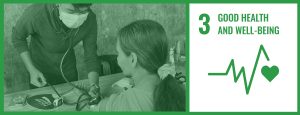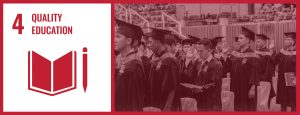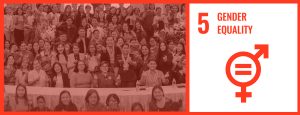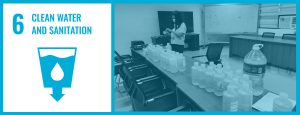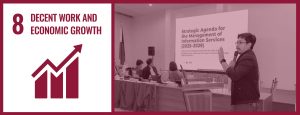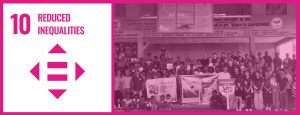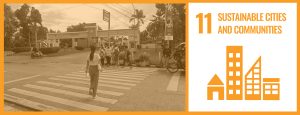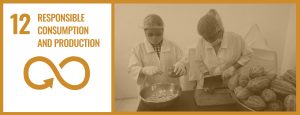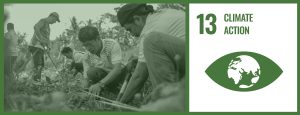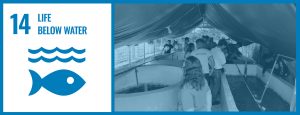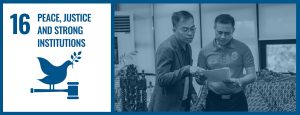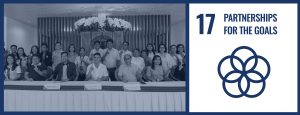2024 Research | SDG 4 – Quality Education
Research Programs
Lexico-Semantic Analysis of True and False Cognates of Ilocano and Yogad
Proponent: Robin V. Guillermo
Abstract
Using two lexicons from the Ilocano and Yogad languages, the study was conducted to confirm the lexical similarity between these two local languages as well as to mine the true and false cognates and come up with a lexical and semantic description of these entries. The Ilocano dictionary was denser compared to the Yogad. However, the matching from the latter to the former of entries yielded a similarity of 50.57% which is very close to the 52% according to a world languages site. The Ilocano language shares numerous true cognates which have a total resemblance to those in Yogad. The languages have more lexical entries that are semantically and partially phonetic resemblances. Only a few were found to be false cognates. The study concluded that though many true cognates exist between the languages, the majority of words are noncognates which pose great challenges to those learning the other.
Self-Determination, Attitude and Performance of Education Students Towards Mathematics in Isabela State University
Proponent: Sheryl Irene E. Manaligod
Abstract
This study investigated how self-determination and attitude towards mathematics among education students relate to their performance in Mathematics in the Modern World subject. Specifically, it aimed to describe the levels of self-determination, attitudes and performance of the students in mathematics, as well as analyze whether significant relationship exists between students’ self-determination, attitudes, and their performance in mathematics. Also, this study utilized a descriptive-correlational method of research. Findings showed that students in Isabela State University have high levels of self-determination and positive attitudes, but their mathematics performance was fairly satisfactory. Additionally, the data indicates that students’ autonomy significantly impacts their mathematics performance. While a sense of accomplishment contributes positively, other elements related to competence have a minimal effect. High anxiety and low confidence are associated with poorer performance, whereas confidence is a key determinant of better outcomes. While beliefs about personal improvement and intelligence have some influence, fixed mindsets and problem-solving approaches do not significantly affect performance. Further research is recommended to include a wider scope of respondents and to investigate additional factors that may influence outstanding mathematics performance.
Exploring Causal Factors of Teenage Pregnancy and Teenage Parents’ Resiliency
Proponent: Helena B. Florendo
Abstract
Teenage pregnancy is a public health concern and teenage parents are also considered as a social concern. Despite the negative stereotype associated with teenage parents, many are determined to prove that the assumptions are wrong. The general purpose of this study is to explore the life experiences and resilience of teenage parents. Specifically, it sought to: 1) identify the level of resiliency of the participants; 2) discover the life experiences of the participants; and lastly, 3) determine the factors that influence the resilience of the participants. This research made used of a sequential explanatory method. Seven participants were invovled in this study; six females and one male. A very high level of resilience was identified among participants. There were two themes discovered in the life experiences of the participants: storms of life and euphoria in the midst of storm. Despite the challenges, the factors that influence the resiliency of teenage parents are the support system; family and child, spiritual beliefs, and self-motivation. The findings of this study call for the support from the family, school, church, as well as private and government institutions.
Integrating Ecopsychology: Path to Climate Change Mitigation
Proponent: Mary Grace O. Gumpal
Abstract
Human activities have significantly impacted Earth’s ecosystems, presenting a complex issue with diverse causes and consequences. At the core of this problem is human behavior. Although there is widespread concern about climate change, attitudes alone are unreliable predictors of future actions due to the influence of various factors. This study aims to bridge the gap between environmental attitudes and behaviors in the community by introducing the principle of ecopsychology, which explores the relationship between humans and nature and investigates why people destroy their habitats. A mixed-method research approach, specifically an explanatory sequential design, is employed to examine the psychological barriers preventing people from translating their pro-environmental attitudes into concrete actions. Barangay leaders of the BIDANI community initially participated in a survey measuring awareness, experiences, environmental attitudes, and self-reported pro-environmental actions. The results indicate that the participants are highly aware of climate change, its effects, and mitigation strategies. However, due to ingrained habits and attitudes, they are not taking the necessary actions and are waiting for others to lead. By addressing these psychological grassroots, we can better mitigate the effects of climate change. The findings provide valuable insights for future efforts to align pro-environmental attitudes with behaviors through planned interventions, ultimately reducing the impact of climate change.
The 21st Century Teaching Strategies of BPED Student Teachers and Their Academic Performance
Proponent: Aida B. Singson
Abstract
The study was primarily conducted with the aims of determining the 21st century teaching strategies of the BPED student teachers and its relationship with their academic performance. In doing such, this study employed the descriptive-correlational research design and the respondents are the Bachelor of Physical Education (BPED) pre-service teachers who were enrolled during the second semester of the SY 2022-2023 from the College of Education. Data were elicited through a structured survey questionnaire and descriptive as well as inferential statistics were used to process the data being gathered. Findings from this study indicated that the academic performance of the respondents ranges from fair to satisfactory. Moreover, in terms of the 21st century teaching strategies that they used, it revealed that they strongly practiced all of the strategies from the eight domains of instructional strategies which include students possess social and cross-cultural skills, learners participating in creating builders or producers, students are creative and innovative, students possess critical thinking skills and problem-solving skills, promoting communication and collaboration, students possess information skills, students possess skills to produce and use media creatively, and use of media, multi-channel technology. Furthermore, only one strategy from the domain of students are creative and innovative has been found to have a significant relationship with the academic performance of the respondents. This is due to the natire of this strategy, that it allows the respondents to experience the translation of theory into practice which enhanced their ability to recall and apply their knowledge, reinforcing their learning and contributing to their higher academic achievement.
Impact Assessment of Extension Activities in College of Education at ISU-E
Proponent: Mario P. Tamana
Abstract
This descriptive study aimed to assess the impact of extension activities and the challenges encountered by the community extension providers in the implementation of the approved extension activities in the College of Education at Isabela State University – Echague Campus. Frequency counts and percentages were used. The mean, on the other hand, was also used to determine the impact of extension activities. Results revealed that positive perceptions of extension activities among respondents, emphasizing their role in social and economic development. While challenges exist, particularly in optimizing training times and addressing occasional weather disruptions, the overall implementation of extension programs is effective. Strategic improvements in training, communication, and adaptive management practices are recommended to further enhance program impact and sustainability. The study recommends that the existing college extension training activities may be continued and further enhanced taking into considerations the assessment made on various criteria that were identified. Faculty of the College of Education are encouraged to continue their best practices in terms of planning, disseminating, and Monitoring and evaluation of the approved extension activities. Problems that were encountered such as time allocation in the conduct of extension activities and the use of their own materials or equipments during return demonstration as well as difficulty in the consolidation of reports need to be addressed immediately in order to come up with a more responsive extension training activities. Though there are problems that were “rarely” encountered by the clientele these need not be neglected rather course of actions or interventions need to be addressed. The college extension unit may request assistance from the university for the provision of vehicle in going to the adopted barangay or school when conducting extension activities.
Level of Adherence to Selected Quality Management Processes of Isabela State University: Faculty, Admministration, and Students’ Perspectives
Proponents: Jose P. Gallena, Jr., Marina D. Acerit, Jennelyn L. Raymundo, Randy P. Acoba, Nover D. Esteban
Abstract
This study evaluated the level of adherence of Isabela State University to its Management Processes across planning, monitoring and assessment of performance, monitoring of client satisfaction, evaluation of host agency by the OJT students, student evaluation of teachers, and curriculum development and revision. Results indicated that ISU is generally adherent in following its policies and standards set forth in its management processes. Findings showed no significant differences in perceptions of adherence to planning and assessment processes across the various respondent groups such as the students, faculty and non-teaching staff, and the administrators. However, significant differences were observed in the perceptions of feedback utilization and client satisfaction, with administrators and heads of offices perceiving a higher level of adherence compared to the rest of the groups of respondents. The University’s effective use of feedback in curriculum development, faculty evaluation, and OJT partnerships was highlighted as a key strength. It is recommended that ISU may consider peer-review mechanism where faculty members and non-teaching staff assessn and provide feedback on each other’s performance, to contribute to a more collaborative improvement process.
Developing Students’ Entrepreneurial Competencies among Undergraduate Students: The Case of Isabela State University-Echague
Proponents: Jayson G. Gollayan, Hunter Joseph C. Lim, Leah B. Bitao
Abstract
Entrepreneurship education has become an essential tool for equipping students with the necessary skills, mindset, and confidence to pursue entrepreneurial ventures and contribute to economic development. This study aims to assess the impact of compulsary entrepreneurship education on the development of personal entrepreneurial competencies (PECs) among undergraduate students at Isabela State University (ISU). The research focuses on comparing the entrepreneurial competencies of students from business and non-business clusters. Using the PECs framework,a quantitive survey was conducted across ten competency domains: opportunity seeking, persistence, commitment to work contract, demand for quality and efficiency, risk-taking, goal setting, information seeking , systematic planning and monitoring, persuasion and networking, and self-confidence. A 5-point Likert scale was used to measure the extent to which students exhibit these competencies. Statistical tools such as t-tests were employed to determine significant differences between the two groups. Results revealed that while business students scored significantly higher in opporutnity seeking, there were no substantial differences in the other nine competencies. Both business and non-business students demonstrated strong entrepreneurial competencies overall. The findings suggest that ISU’s entrepreneurship education program effectively cultivates entrepreneurial competencies across disciplines. An action plan is proposed to enhance the entreperneurship curriculum further, ensuring that students from all fields of study develop the necessary entrepreneurial skills to thrive in a competitive economic environment.
An Analysis of the Factors that Influence Graduates’ Performance in the CPA Licensure Examination
Proponents: JLouwella A. Maniego, Ermhan R. Maniego
Abstract
The study examines the factors affecting graduates’ performance in the Certified Public Accountant Licensure Examination (CPALE) at Isabela State University-Echague Campus. The research, conducted using a descriptive qualitative and correlational approach, surveyed 125 CPALE takers, with 98 respondents participating. The study aimed to guide administrators and faculty in developing strategies and policies to prepare students and graduates for passing the CPA licensure examination. The results were analyzed using logistic regression and correlation analyses, providing valuale inisghts for future planning and preparation. Academic awards were found to be a strong predictor of success, while personal factors such as motivation and the ability to manage pressure also significantly impacted student outcomes. Weak associations with student and home factors suggest the need for further exploration. The significant correlation between the accounting curriculum and exam performance suggests that academic improvements could enhance success rates. However, review center attendance alone showed no significant impact, emphasizing the importance of additional academic strategies. Key recommendations include recognizing academic axcellence, interating programs to develop personal skills such as stress management, and revising the accounting curriculum to better align with exam requirements. Further research on review center effectuveness, as well as longitudinal and qualitative studies, is proposed to gain deeper insights into the factors influencing CPA exam success.
More than ISU CBAPA’s KSA? Designing Faculty Researchers’ Quality Professional Development Prospective Framework for Sustainable Improvement in Research Engagement Study:Knowledge of Institutional Research Ecosystem
Proponents: Ralliegh F. Vizcarra, Amie P. Bala, Jayson G. Gollayan, Mariflor M. Devibar
Abstract
This study investigates the factors influencing research engagement among faculty members at the College of Business, Accountancy, and Public Administration (CBAPA) at Isabela State University (ISU). It highlights the significance of faculty involvement in research for professional development and improved educational quality. Utilizing a mixed-methods approach, the research identifies critical knowledge areas necessary for effective research practices, including critical thinking, diverse methodologies, and grant writing skills. Participants reported limited awareness of institutional resources and funding opportunities, indicating a pressing need for enhanced communication and support. The findings reveal that only 28.4% of faculty were fully aware of available insitutional resources, underscoring gaps in knowledge that hinder research productivity. The study proposes a framework aimed at fostering a strong research culture within CBAPA, emphasizing the integration of teaching and research as essential for academic excellence. By addressing these gaps through targeted outreach and training initiatives, the instituions can empower faculty researchers to maximize their initiatives, the institution can empowe faculty researchers to maximize their potential, ultimately contributing to sustainable growth and enhanced academic standing.
More than ISU CBAPA’s KSA? Designing Faculty Researchers’ Quality Professional Development Prospective Framework for Sustainable Improvement in Research Engagement Study:Research Core Knowledge, Technical and Soft Skills
Proponents: Ralliegh F. Vizcarra, Rolly L. San Jose, Meryl Pearl L, Facun, Mariflor M. Devibar
Abstract
This study explores the critical need for a structured professional development (PD) framework aimed at enhancing the core knowledge, technical skills, and soft skills of faculty researchers at Isabela State University College of Business, Accountancy, and Public Administration (ISU CBAPA). Findings reveal that while faculty members possess moderate knowledge of research methods, significant gaps exist in areas such as data collection, ethical practices, data analysis techniques, and publishing strategies. The research emphasizes the importance of integrating both technical and soft skills in PD initiatives to foster a culture of research excellence. By employing a mixed-methods approach, including qualitative descriptive and thematic analysis, the study identifies key areas for improvement and proposes targeted training programs to enhance faculty competencies. Ultimately, investigating in comprehensive PD initiatives is esential for empowering faculty to conduct high-quality research and effectoivley disseminate their findings.This aligns with existing literature that underscores the positive impact of holistic faculty development on research engagement and productivity. The proposed framework aims to cultivate a stronger academic culture at ISU CBAPA, thereby enhancing the overall impact of scholarly contributions.
More than ISU CBAPA’s KSA? Designing Faculty Researchers’ Quality Professional Development Prospective Framework for Sustainable Improvement in Research Engagement Study:Attitudinal Traits, Institutional Supports & Challenges
Proponents: Ralliegh F. Vizcarra, Jessica C. Managuelod, Jeanette Gonzales
Abstract
This study explores the essential knowledge areas and professional developmenyt (PD) needs of faculty researchers at ISU CBAPA to enhance their research engagement and productivity. Five key themes emerged: critical thinking and diverse methodologies, proficiency in quantitative and qualitative analysis, effective communication and collaboration, continual learning, and grant writing skills. Additionally, the research highlights the importance of understanding the organizational research structure, funding opportunities, and fostering a supportive research culture. Findings indicate that while faculty exhibit moderate knowledge in research methods, gaps exist in areas such as data collection, ethical practices, and publishing processes. The results underscore the necessity for a comprehensive PD framework that includes targeted training sessions, mentorship opportunities, and resource accessibility to empower faculty researchers. By addressing theses gaps, ISU CBAPA can cultivate a more robust research environment that promotes collaboration, innovation, and effective dissemination of research findings.
Closer Look to Explore the Knowledge, Skills & Attitudes (KSA) on the Faculty Community Engagement of the College of Business, Accountancy & Public Administration (CBAPA) Isabela State University Echague, Isabela Study: Knowldege of Community Service
Proponents: Amie G. Bala, Ralliegh F. Vizcarra, Jayson G. Gollayan, Vivian M. Dumrique
Abstract
This study develops a framework for assessing community service knowledge among faculty extensionists in the College of Business, Accountancy & Public Administration (CBAPA) at Isabela State University. Recognizing the critical role of community service in higher education, the research identifies gaps in faculty engagement and effectiveness, exacerbated by a disconnect between theoretical knowledge and practical application. The study employs a mixed-methods approach to explore the current level of knowledge among faculty regarding community needs, environmental awareness, and effective extension practices. key objectives include defininf essential knowledge components and assessing personal perspectives on community service initiatives. Findings reveal that faculty often struggle with understanding local cultural dynamics, which impedes their effectiveness. the study recommends targeted training programs and structural support to enhance faculty engagement in community service. The developed framework aims to foster sustained community partnerships, ensuring faculty are equipped to meet evolving community needs. This approach is vital for promoting deeper commitment to community engagement within academic institutions, ultimately contributing to the development of responsive community service initiatives.
Closer Look to Explore the Knowledge, Skills & Attitudes (KSA) on the Faculty Community Engagement of the College of Business, Accountancy & Public Administration (CBAPA) Isabela State University Echague, Isabela Study: Core and Soft Skills
Proponents: Amie G. Bala, Ralliegh F. Vizcarra, Exequiel M. Perez, Rolly L. San Jose
Abstract
This study explores the role of core and soft skills in enhancing the community engagement of faculty members at the College of Business, Accountancy, and Public Administration (CBAPA) at Isabela State University. Faculty involvement in extension activities is crucial in bridging academic knowledge and local community needs. However, there is a gap in understanding the competencies that contribute to impactful community engagements. This research evaluates the proficiency of CBAPA faculty in critical knowldege areas such as communication outreach. Utilizing a mixed-method approach, the study assesses the faculty’s motivation, collaboration efforts, and institutional support to develop a conceptual framework aimed at fostering sustained and meaningful community involvement. Findings suggest that while faculty members demonstrate strong communication and collaboration skills, there is room for improvement in technological proficiency and problem-solving. The study underscores the need for targeted faculty development programs to enhance both core and soft skills, thereby promoting a more structured and effective approach to community engagement. The outcomes provide insights into designing professional development initiatives that align faculty competencies with the demands of community extension activities.
Closer Look to Explore the Knowledge, Skills & Attitudes (KSA) on the Faculty Community Engagement of the College of Business, Accountancy & Public Administration (CBAPA) Isabela State University Echague, Isabela Study: Attitudinal Traits, Challenges and Supports
Proponents: Amie G. Bala, Leah B. Bitao, Norvelyn B. Bautista, Mariflor M. Devibar
Abstract
Community engagement is a critical aspect of higher education, facilitating the connection between acadmeic institutions and their surrounding communities. This studyaims to develop a comprehensive framework that examines the attitudinal traits, challenges, and support systems influencing the effectivess of faculty extensionists at the College of Business, Accountancy, and Public Administration (CBAPA) of Isabela State University. Key Attitudinal traits such as adaptability, collaboration, and accountability were explored alongside challenges like resource limitations, bureaucratic barriers, and post-pandemic restrictions. The study utilized a mixed-method approach, inciporating structured questionnaires and thematic analysis to assess faculty experiences and the support mehanisms available for community engagement. Results highlight the importance of internal and external linkages, as well as institutional support in enhancing faculty efforts. By identfying the traits, challenges, and supprt systems that shape faculty extensionists’ experiences, thi research provides valuable insights into improving community engagement practices within academic settings.
“Utilizing an artificial intelligence-based approach for analyzing student performance and providing course recommendations to optimize overall efficiency and effectiveness.”
Proponent: Manocher C. Alipour
Abstract
A student’s academic performance is an improvement in knowledge and skills.Their grade point average, demeanor, and educational growth from lower to higher earning reflect this improvement. Monitoring must be done professionally and according to the criteria. Teachers and administrators often evaluate students’ success based on classroom performance, graduation rates, and standardized test scores. Academically, students must work hard in class. A course recommender system utilizes algorithms to analyze user choices, academic performance, and other pertinent factors to provide personalized course recommendations based on the individual’s history and interests. Recommender systems were developed to address individuals’ reliance on others for routine decisions. Predicting academic achievements helps track student development and identify individuals at risk of failing. The logistic regression experiment used a dataset with 135 rows, 70% training and 30% validation data. The model has the following characteristics. The model had the highest accuracy marks, 73.98% training, and 66.66% testing. The resulting cosine similarity index matrix indicates that raw data set 118 exhibits the highest similarity index at 82% compared to the input data. Following closely are raw data sets 76, 106, and 86, with similarity indicesof 80%, 80%, and 79% , respectively, concerning the input data.
“Utilizing an Artificial intelligence- based Approach to Evaluate Student Academic Performance through the Application of a Logistic Regression Algorithm”
Proponent: Manocher C. Alipour
Abstract
A student’s academic performance is an improvement in knowledge and skills. Their grade point average, demeanor, and educational growth from lower to higher learning reflect this improvement. Many sectors worldwide regard ICT as a crucial engine of innovation and efficiency. ICT is essential for college students inside and outside the classroom. Monitoring Student or corporate performance is vital to academic or business operations. Monitoring must be done professionally and according to the criteria. Academic achievement is student success in multiplesubjects. Teachers and administrators often evaluate students’ success based on classroom performance, graduation rates, and standardized test scores.Academically, students must work hard in class. Students’ performance is linked to teachers’ teaching and communication methods. Predicting student success with machine learning and EDM is not new. Predicting academic achievements helps track student development and identify individuals at risk of failing. The logistic regression experiment used a dataset with 135 rows, 70% training and 30% validation data. The model has the following characteristics. The model had the highest accuracy marks, 73.98% training, and 66.66% testing.
“Utilizing an Artificial intelligence- based Approach for Course Recommendations through the Application of Cosine Similarity”
Proponent: Manocher C. Alipour
Abstract
A course recommender system utilizes algorithms to analyze user choices,academic performance, and other pertinent factors to provide personalized course recommendations based on the individual’s history and interests. Information and knowledge exchange play pivotal roles in the contemporary landscape of technological innovation and teaching methodology development. Recommender systems were developed to address individuals’ reliance on others for routine decisions. Based on stored student data, manual course selection presents inefficiencies and risks, particularly in environments with a high volume of students. In data analysis, cosine similarity is a metric for determining the similarity between non-zero vectors within an inner product space. The resulting cosine similarity index matrix indicates that raw data set 118 exhibits the highest similarity index at 82% compared to the input data. Following closely are raw data sets 76, 106, and 86, with similarity indices of 80%, 80%, and 79%, respectively, concerning the input data.
School Need Assessment of Angadanan, Isabela: Key for Gender Responsive Extension Program
Proponents: EUGELYN R. FELIX, JUDITH E. DARACAN, PAULINO V. DERILO
Abstract
The study employed a descriptive design using a quantitative approach to assess the training needs of secondary school faculty members in Angadanan, Isabela, Philippines. The respondents included male and female faculty, non-teaching staff, and students from secondary schools in the municipality, selected through purposive sampling. A self-made
survey questionnaire was used to gather data on the personal information, training experiences, and training needs of the respondents. The questionnaire also included a 5-point Likert scale to assess the degree of knowledge and skills of both student and teacher respondents. The data analysis involved frequency and percentage distribution to determine
the distribution of responses for each item in the questionnaire, providing insights into the training experiences, knowledge, skills, and needs of the secondary school faculty. Descriptive statistics, including mean and standard deviation, were used to assess the degree of knowledge or skills of the respondents. The study found that the majority of the
faculty members are relatively young, with 75.6% falling within the age brackets of 21-40 years. The faculty members have advanced levels of communication, interpersonal, and
pedagogical skills, but their ICT, leadership, technological, research writing and publication, entrepreneurship, mental health, and gender and development related skills are at an intermediate level. The most pressing needs among the faculty respondents are research writing and publication, ICT skills, and pedagogical skills. The majority of the student respondents are within the 11-15 years old age range, and the study suggests that the secondary schools in the municipality have a larger population of younger students compared to older students and a larger population of female students compared to male students. The study highlights the importance of addressing the diverse range of special needs among both students and faculty members through targeted interventions and support. The findings provide valuable insights that can inform the development of training programs and extension initiatives to enhance the skills and knowledge of the secondary school faculty and students.
“Mga Gawain sa Makrong Kasanayan: Kabisaan Nito sa Paglinang ng Kakayahan ng mga Mag-aaral sa Masining na Pagtatanghal”
Proponents: PAULINO V. DERILO, DR. EDITHA C. BAUTISTA
Abstract
Nakapokus ang pag-aaral sa pagtukoy sa kabisaan ng mga gawain sa makrong kasanayan tungo sa masining na pagtatanghal. Nilayon ng pag-aaral na tukuyin ang mga pagsasanay at gawain na nakalinang ng kakayahan ng mga mag-aaral sa masining na pagtatanghal batay sa pakikinig sa pamamagitan ng rinig ko, drama ko, pagsasalita sa pamamagitan ng radio broadcasting, pagbasa sa pamamagitan ng interpretatibong pagbasa at pagsulat sa pamamagitan ng sulatanghal. Sa pamamaraan ng pag-aaral, ginamit ang palarawan o deskriptib sa pamamagitan ng kwantiteytib gamit ang panukatan sa pagsusuri sa kabisaan sa paggamit ng mga gawain at pagsasanay sa masining na pagtatanghal. Ang pamantayang ginamit ay hango sa panukatan sa pagsusuri sa kabisaan ay hango sa mga gawain na isinasagawa sa Festival of Talents ng Department of Education (2012). Sa resulta nito, natuklasang mabisa ang mga gawain at pagsasanay sa paglinang ng kakayahan ng mga mag-aaral tungo sa masining na pagtatanghal at nalinang ang iba’t ibang kasanayan na maaaring magagamit nila sa kanilang pang-araw-araw na pakikipagtalastasan. Pinatutunayan ng resultang ito na ang mga gawain, kagamitan, pamamaraan ng pagsasagawa ng programa ay epektibo, bagay na kailangang pag-ibayuhin ng kagawaran at patuloy na suportahan ng administrasyon ang katulad ng ganitong mga gawain.
“Kakayahan ng mga Mag-aaral sa Masining na Pagtatanghal ng Makrong Kasanayan”
Proponents: PAULINO V. DERILO, DR. EDITHA C. BAUTISTA
Abstract
Nakapokus ang pag-aaral sa pagtukoy sa kakayahan ng mga mag-aaral sa mga makrong kasanayang pangwika tungo sa masining na pagtatanghal kaugnay sa implementasyon ng programang “Sining Tanghal sa Eskuwela”, isang programang ekstensiyon ng BSEd ng Isabela State University-Angadanan Campus. Nilayon ng pag-aaral na tukuyin ang propayl ng mga naging kliyente o respondente ng programa kasama ang kanilang kakayahan sa panimula at panghuling gawain sa makrong kasanayang pangwika tungo sa masining na pagtatanghal batay sa pakikinig sa pamamagitan ng rinig ko, drama ko, pagsasalita sa pamamagitan ng radio broadcasting, pagbasa sa pamamagitan ng interpretatibong pagbasa at pagsulat sa pamamagitan ng sulatanghal. Sa pamamaraan ng pag-aaral, ginamit ang palarawan o deskriptib sa pamamagitan ng kwantiteytib gamit ang panukatan sa pagtataya sa masining na pagtatanghal. Ang pamantayang ginamit ay hango sa panukatan sa pagsusuri sa kakayahan ng mga mag-aaral sa iba’t ibang larang na isinasagawa tuwing Festival of Talents ng Department of Education (2012). Sa resulta nito, natuklasang mahusay na mahusay mula sa isinagawang post-test na gawain ng mga mag-aaral batay sa apat na makrong kasanayan ayon sa kanilang propayl batay sa edad, kasarian at edad. Pinatutunayan ng resultang ito na ang mga gawain, kagamitan, pamamaraan ng pagsasagawa ng programa ay epektibo, bagay na kailangang pag-ibayuhin ng kagawaran at patuloy na suportahan ng administrasyon ang katulad ng ganitong mga gawain.
“Implementasyon ng Programang Sining Tanghal sa Eskuwela: Pananaw at Saloobin ng mga Guro at Mag-aaral”
Proponents: PAULINO V. DERILO, DR. EDITHA C. BAUTISTA
Abstract
Nakapokus ang pag-aaral sa pagtukoy sa saloobin ng mga mag-aaral at guro sa implementasyon ng programang “Sining Tanghal sa Eskuwela”, isang programang ekstensiyon ng Isabela State University-Angadanan Campus. Ang programang ito ay tumutulong sa paglinang ng kasanayan ng mga mag-aaral sa mga makrong kasanayang pangwika tungo sa masining na pagtatanghal. Nilayon ng pag-aaral na tukuyin ang kabuoang pananaw ng mga respondente kaugnay sa implementasyon ng programa kung saan inalam, ang mga gawain, kagamitan, pamamaraan maging ang tagasanay o tagapanukala ng programa. Sa pamamaraan ng pag-aaral, ginamit ang palarawan o deskriptib sa pamamagitan ng kwantiteytib gamit ang sarbey na kuwestiyonaryo at kwaliteytib sa pamamagitan ng interbyu upang mabigyang patunay ang mga datos sa kuwestiyonaryo. Ang mga pahayag sa mga tanong o pahayag sa kagamitan ay hinalaw sa panukatan at pagtukoy sa kakayahan ng mga mag-aaral sa iba’t ibang larang na isinasagawa tuwing Festival of Talents ng Department of Education (2012). Sa resulta nito, natuklasang lubos na sinang-ayunan ng mga respondente na positibo ang programa bilang karagdagang pagsasanay ng mga mag-aaral sa pagpapamalas ng mga iba’t ibang kasanayan. Pinatutunayan ng resultang ito na ang mga gawain, kagamitan, pamamaraan ng pagsasagawa ng programa ay epektibo, bagay na kailangang pag-ibayuhin ng kagawaran at patuloy na suportahan ng administrasyon ang katulad ng ganitong mga gawain.
“Road Users’ Competency and Traffic Law Awareness: An Input to Higher Education Institutions (HEIs) Road Users Safety Education and Intervention Program”
Proponents: Ronie G. Torres, Philmark M. Dalit, Ferdinand N. Pajarillo and Robielyn O. Bartido
Abstract
This study investigates the role of Higher Education Institutions (HEIs) in enhancing road safety through education and awareness of traffic laws and driving competencies among young drivers and to support the UN’s goal of providing safe and sustainable transport systems, particularly for vulnerable road users, that despite of being influential in sustainable development, research on universities contributions to transportation-related goals is limited. A survey was conducted using a questionnaire, patterned from the Filipino Drivers’ Manual (FDM) and TESDA Training Regulations (TR) to assess the demographics, driving experience, traffic law awareness and competency of students. Results of the study showed that the predominantly young, male population with many novice drivers lacking formal instruction, which correlated with reported driving violations. The analysis indicates that driving experience significantly enhances awareness of traffic laws, while demographic factors have minimal impact on competency. Recommendations include developing targeted driver education and intervention programs, launching awareness campaigns, and involving parents and teachers to reinforce safe driving habits. Further research is suggested to explore various factors influencing awareness and competency. _____________________
Keywords: competency, land transportation, higher education, road users, traffic
Capturing the Most Significant Changes From College Extension Projects of ISU Cabagan through Clients’ Narratives
Proponents: Rosalinda S. Guingab, DComm; Myrna C. Cureg, PhD; Regina Blair S. Santiago, MSDC
Study 1: Identification and Screening of College Extension Projects
Study 2: Stories of Most Significant Changes from Mabuwaya-Funded Extension Projects
Study 3: Development of IEC Materials Featuring the Most Significant Stories of Change from the College Extension Projects of ISU Cabagan
Abstract
Using the Most Significant Change (MSC) as its framework, this research documents community perspectives on the Save Our Species extension project’s socio-cultural and economic impacts. Key themes include changes in perceptions toward the Philippine crocodile, increased community participation in conservation, cultural and economic effects of conservation, empowerment of indigenous communities, establishment of the roles of local sanctuary guards, and provision of other livelihood opportunities. The findings offer insights into how Communication, Education, and Public Awareness (CEPA) activities on conservation, as part of an extension project, can foster sustainable development and provide guidance for future initiatives aimed at ensuring the long-term
preservation of endangered species.
Generating Bessel beams with an elastomeric replica of a Weevil Carapace
Proponents: Paz Victoria T. Ramos, Mitchie Vianca D. De Vera, and Raphael A. Guerrero
Abstract
We generate a zero-order Bessel beam with a laser beam focused onto an elastomeric replica of a weevil carapace scale. Carapace surface structures are printed on an elastomeric cast cia soft lithography. The output Bessel beam exhibits the expected properties of non-diffraction over a propagation range of 30 cm. The width of the central spot at a propagation distance of 25 cm is 296:8μm, corresponding to a replicated weevil scale with a diameter of 128.6±7.02μm,acting as an annular slit. Self healing of the beam after encountering a wire obstruction is also observed.
Perceived Risks and Effects of Heat Stress to Students and their Coping Strategies
Proponents: Bondee L. Peñaflor, PhD, Beverly Gay N. Cambri, PhD
Abstract
The study assessed the perceived risks and effects of heat stress to students and their coping strategies which could serve as input for policy and institutional innovation in the school. A cross-sectional survey research design was employed in this study covering 583 respondents. Data were analyzed using both descriptive and inferential statistics. Results show that the perceived risk with the highest weighted mean are: I am afraid that hot weather during these days can cause me an injury or sickness; People exposed to heat have a greater risk of developing serious diseases; and Heat is a potentially lethal risk. Meanwhile, the perceived effects of heat stress with the highest weighted mean is Tiredness/Exhaustion, followed by difficulty in getting sleep resulting in decrease in hours of sleep, and due to excessive heat, they were not able to study well at home and in school. To address these effects, foremost of the coping strategies of the students is by drinking cold water, juice or carbonated drinks, and also keeping a personal tumbler to keep drinking water. In addition, students wear comfortable clothes to enhance thermal comfort and bathe more frequently to cope with heat stress. They also utilized trees and parks as the preferred places to stay or resting space for thermal comfort during hot days. Finally, the students were satisfied (weighted mean ranging from 4.11 to 4.26) on the school’s efforts in addressing the effects of heat stress. The study on the Perceived Risks and Effects of Heat Stress to Students and their Coping Strategies aligns well with the United Nations Sustainable Development Goals (SDGs), particularly in the areas of good health and well-being (SDG 3), quality education (SDG 4), and climate action (SDG 13).
The Self ACES of Students in their Tertiary Education Journey: Basis for Enhancement of Student Welfare Programs
Proponents: Margie P. Vinasoy, Beverly Gay N. Cambri
Study 1: Self- Adjustment of First Year Students: Guide for Developing College Adjustment Program
Study 2: Self- Care Habits and Social Connectedness of College Students
Study 3: The Emotional Stability and Academic Success of Working College Students
Abstract
The project, The Self ACES of Students in their Tertiary Education Journey: Basis for Enhancement of Student Welfare Programs, explores three distinct studies aimed at understanding key factors affecting the well-being, adjustment, and success of college students. The overarching goal of the project is to identify areas for enhancing student welfare programs to better support student development during their tertiary education. This project aligns with the achievement of SG3 and 4.
Study 1: Self-Adjustment of First Year Students: Guide for Developing College Adjustment Program
This study examined the self-adjustment challenges faced by first-year students at Isabela State University-Cabagan Campus, with a focus on sex differences. The sample comprised 327 students, of whom 58.72% were female and 41.28% male. It was revealed in this study the prevalence of adjustment concerns, with interpersonal problems being the most common (92.35%), followed by career-related issues (44.95%), academic challenges (43.43%), and self-esteem concerns (34.86%). Family problems (22.32%), anxiety (21.1%), depression (12.84%), and substance abuse (12.01%) were also reported, while suicidal ideation, though less common, affected 6.73% of students. Sex differences were found in self-esteem issues and substance abuse, with male students reporting higher levels of both. Male students also showed more vulnerability to substance abuse, reflecting trends in coping mechanisms for stress. This study also revealed significant relationships between sex and all nine adjustment concerns, namely academic problems, depression, suicidal ideation, substance abuse, family issues, and career problems, indicating that sex plays a critical role in how students navigate these challenges. These findings underscore the importance of developing sex-sensitive support services to address the distinct needs of male and female students, such as self-esteem workshops for males and substance abuse prevention programs.
Keywords: self-adjustment, first-year students, college adjustment program, academic challenges, university transition
Study 2: Self-Care Habits and Social Connectedness of College Students
This study explored the self-care habits and social connectedness of college students, investigating how these variables intersect. Emotional self-care was found to be the most frequently practiced, while students reported a high sense of closeness but lower levels of satisfaction, belongingness, and support in their social interactions. The study found no significant relationship between self-care habits and social connectedness, suggesting that self-care practices may be more individualized and not necessarily reflective of enhanced social engagement. These findings highlight the need for interventions that simultaneously promote personal well-being and foster strong social support systems.
Keywords: self-care habits, social connectedness, college students
The project, The Self ACES of Students in their Tertiary Education Journey: Basis for Enhancement of Student Welfare Programs, explores three distinct studies aimed at understanding key factors affecting the well-being, adjustment, and success of college students. The overarching goal of the project is to identify areas for enhancing student welfare programs to better support student development during their tertiary education. This project aligns with the achievement of SG3 and 4.
Study 1: Self-Adjustment of First Year Students: Guide for Developing College Adjustment Program
This study examined the self-adjustment challenges faced by first-year students at Isabela State University-Cabagan Campus, with a focus on sex differences. The sample comprised 327 students, of whom 58.72% were female and 41.28% male. It was revealed in this study the prevalence of adjustment concerns, with interpersonal problems being the most common (92.35%), followed by career-related issues (44.95%), academic challenges (43.43%), and self-esteem concerns (34.86%). Family problems (22.32%), anxiety (21.1%), depression (12.84%), and substance abuse (12.01%) were also reported, while suicidal ideation, though less common, affected 6.73% of students. Sex differences were found in self-esteem issues and substance abuse, with male students reporting higher levels of both. Male students also showed more vulnerability to substance abuse, reflecting trends in coping mechanisms for stress. This study also revealed significant relationships between sex and all nine adjustment concerns, namely academic problems, depression, suicidal ideation, substance abuse, family issues, and career problems, indicating that sex plays a critical role in how students navigate these challenges. These findings underscore the importance of developing sex-sensitive support services to address the distinct needs of male and female students, such as self-esteem workshops for males and substance abuse prevention programs.
Keywords: self-adjustment, first-year students, college adjustment program, academic challenges, university transition
Study 2: Self-Care Habits and Social Connectedness of College Students
This study explored the self-care habits and social connectedness of college students, investigating how these variables intersect. Emotional self-care was found to be the most frequently practiced, while students reported a high sense of closeness but lower levels of satisfaction, belongingness, and support in their social interactions. The study found no significant relationship between self-care habits and social connectedness, suggesting that self-care practices may be more individualized and not necessarily reflective of enhanced social engagement. These findings highlight the need for interventions that simultaneously promote personal well-being and foster strong social support systems.
Keywords: self-care habits, social connectedness, college students
Study 3: Emotional Stability and Academic Success Among Working College Students
This study focused on the relationship between emotional stability and academic success among working students. Key personality traits, such as social interaction, trustfulness, self-discipline, and timidity, were analyzed in relation to academic performance. The majority of respondents achieved a general weighted average (GWA) between 1.75 and 2.00, with no students reaching the 1.00 (excellent) or 3.00 (passing) GWA benchmarks. While most dimensions of emotional stability did not significantly correlate with academic performance, traits like distrustfulness and gregariousness were identified as potential influencers, with distrustful students engaging in deeper learning and gregarious students benefiting from social interaction and collaboration.
Fostering Self-Directed Learning in Java Programming: Development and Evaluation of Laboratory Manual as a Supplementary Learning Material
Proponents: Ivy M. Tarun, Rosemary L. Buraga
Abstract
This study aimed to evaluate the perceived effectiveness of using a laboratory manual as supplementary learning material in a basic Computer Programming course, particularly on the integration of self-directed learning components. The study assessed the perceived effectiveness of the manual based on factors such as gender, prior programming experience, academic background, and socioeconomic status. Additionally, it explored student engagement with the manual and evaluated satisfaction regarding its usefulness, technical quality, and relevance to course content.
The laboratory manual was developed with SDL components for each session, including intended learning outcomes, guided activities, laboratory exercises, rubrics, and item scoring, designed to promote student autonomy and facilitate skill-building at their own pace. Results showed no significant differences in perceived effectiveness based on gender, academic background, or socioeconomic status. However, students with intermediate programming experience rated the manual higher in effectiveness, while those with no prior experience rated it lower. Engagement levels were consistent across demographic groups, indicating the manual effectively engages students regardless of their background or prior experience.
In terms of satisfaction, female students rated the manual higher for usefulness, technical quality, and relevance compared to male students. Overall, the manual received positive feedback, particularly in usefulness, affirming its value as a supplementary learning resource. Notably, students from low-income backgrounds rated the manual highest in satisfaction, while those from higher-income backgrounds provided lower ratings, possibly reflecting differing expectations or experiences with educational resources.
Challenges and Difficulties: Teaching General Education Curriculum During and Post Pandemic
Proponents: Sheila Marie D. Sibug & Marines S. Zilabbo
Abstract
This study was conducted to determine the challenges and difficulties encountered by the teachers of General Education Curriculum subjects at Isabela State University City of Ilagan Campus. Based on responses gathered from surveys and relevant literature. Four key themes emerge from the data: Time Management and Stress, Limited Facilities, Emotional and Mental Well-being, and Adaptation, Access, and Institutional Support. Teachers reported difficulties in managing time effectively due to adapting to new learning formats and schedules during the pandemic, compounded by stressors such as technical issues and limited facilities. Emotional and mental well-being emerged as significant concerns, particularly post-pandemic, as the transition to remote learning and associated stressors impacted both teachers and students. Moreover, access to necessary resources, including internet connectivity and gadgets, was highlighted as essential for overcoming challenges. Institutional support, such as providing internet connections and scheduled reporting, was also noted as crucial in addressing some of the challenges faced by teachers. The findings align with existing literature, indicating similar challenges reported by teachers globally during the pandemic. Recommendations for strengthening the distance education system include bolstering infrastructure, providing access to resources, and offering psychological support and in-service training for educators. Thus, the study revealed the challenges faced by teachers during and post-pandemic and underscores the importance of institutional support in navigating these challenges effectively.
TEACHING ENGLISH THROUGH ENGLISH: EXPLORING ANXIETY IN NON-NATIVE PRE-SERVICE ESL TEACHERS
Proponent: Sheila Marie D. Sibug
Abstract
This study explores the factors influencing anxiety levels among pre-service ESL teachers of Isabela State University City of Ilagan Campus when teaching and speaking in English. Through thematic analysis of responses from pre-service ESL teachers, several key themes emerged. Fear of judgment and criticism, perfectionism, preparation and knowledge, social anxiety and comparison, performance pressure, concerns about classroom management, and negative feedback and reactions were identified as influential anxiety factors.
The findings also underscore the multifaceted nature of anxiety in ESL teaching and speaking through analyzing a 24-item statements on factors affecting the level of anxiety of the preservice teachers ESL teachers revealing a weighted mean of 3.26, describes as “moderately agree” these have been influenced by various psychological, linguistic, and situational factors. Building confidence and adopting a positive mindset, practicing and preparation, accepting mistakes and constructive feedback, gradual exposure, and providing support were identified as potential strategies to overcome anxiety in the ESL classroom. In addition, the study highlights the importance of understanding and addressing anxiety in ESL contexts to support pre-service ESL teachers in developing their language proficiency and teaching skills. Implementing effective strategies to manage anxiety can contribute to creating a supportive learning environment conducive to language acquisition and teacher professional development.
Further research and practical interventions are warranted to explore the efficacy of these strategies in mitigating anxiety and enhancing teaching effectiveness in ESL settings.
Content Analysis of Licensure Examination for Teachers: Traditional Vs. Non-Traditional Teacher Assessment
Proponent: Ruby B. Dimas, PhD
Abstract
This study assessed the content or items set of the Licensure Examination for Teachers (LET); come up with an alternative assessment tool that would enhance teacher’s effectiveness and contribute to the lifelong income of an educated individual; and recommend possible action plans to enhance licensure examination items sets and align it to the required skills of the 21st century employing descriptive explanatory research design with content analysis approach to examine the LET reviewers used (which were authored by different faculty members/ reviewers from different universities in the country), and to determine topics of interests and authors within the existing teacher assessment studies. Licensure Examination for Professional Teachers (LEPT) is still considered as an instrument in the development of human capital. The Licensure Examination items consist of competencies needed by teachers for future professional advancement and is considered as quality assurance of education for it encourages professionalism among teachers, and consequently ensure quality education among students. The Philippine government through Professional Regulation Commission (PRC) may review further the competencies in the LET items by aligning the table of specification (TOS) in the curriculum offered among Teacher Education Institutions (TEIs).
Design and Development of Face Mask Detection System with Face Recognition Feature using LBPH Algorithm
Proponent: Michael Bryan P. Lumaban, DIT
Abstract
People using face protection masks are still frequently seen in public given the present severity of the global pandemic. Face masks, however a protective precaution against COVID-19, may be impairing our ability to recognize faces. Close Circuit Television (CCTV). This electronic device is generally used for security and widely installed and utilized in schools, offices, shopping malls, grocery store, and other public places. CCTV can be further optimized to integrate facial recognition so it doesn’t only document crimes but to detect individual in not wearing of facemask when they are in the public place to protect themselves and prevent the virus to spread. This research used descriptive and system development methods in developing a Face Mask Detection System with Face recognition Feature using LBPH Algorithm.
Teaching Challenges and Opportunities of Tertiary Faculty
Proponent: Clarinda C. Galiza, PhD
Abstract
This research study was conducted in order to trace the teaching challenges, as well as the teaching opportunities of Isabela State University, San Mariano Campus faculty for SY 2022-2023. It also generated information about the profile of the faculty respondents like age, college graduated, academic rank, status of appointment and educational attainment. Isabela State University, San Mariano Campus has more number of female faculty with a percentage of 54.1. Less than half of the respondents belong to early adulthood with 43.9 percent and most of them graduated from higher public institutions with 81.1 percent. About their encountered teaching challenge, 86 percent of them are bothered in relation to students coming to their classes unprepared. As far as teaching opportunities are concerned, 50% of the respondents recognize development of skills and abilities through training attendance as a major opportunity spared by the campus. Overall, this research study shows the importance of support system and effective policies to foster professional development and enhance the quality of tertiary education. Hence, support programs need to be proposed along the major challenge encountered by the respondents. The said support programs can include individual or group counselling and mentorship. These can ensure improvement of academic outcomes in the tertiary level as a quality response to the dilemma.
Predictors of Performance in the Board Licensure Examination for Professional Teachers: The Case of K to 12 Graduates
Proponents: Ryan Jay O. Agron, Manuel C. Francisco, Oprha S. Saguibo
Abstract
This study employed quantitative study particularly non-experimental research and retrospective-predictive studies. The researchers aimed to determine the predictors of performance in the board licensure examination for professional teachers in the case of the first batch of K to 12 graduates. They utilized total population as sampling procedure. Adopted and validated questionnaires were used for the research instruments. The study found that graduates’ academic achievement did not translate to higher BLEPT results, indicating a systemic issue with retention policies. Teaching methodology, resources, teacher-student relationships, and teachers’ teaching strategies were found to be significant predictors of BLEPT performance. Teachers’ pedagogical competence, school support, and the role of a teacher as an instructional leader were also crucial factors. The barely passing rate in the BLEPT indicates poor educational foundation, and specialized knowledge and skills in specialization are essential. GenEd scores in the competency-based examination contributed the most to BLEPT performance. Institutions should consider teachers as key stakeholders in curriculum implementation at the classroom level.
Enhancing the Basic Services on the Implementation of Sustainable Development Goals: The Municipality of San Mateo Case
Proponents: Rosalie C. Leal, Venus A. Diego
Abstract
The paper examines the role of Local Government Units (LGUs) in providing quality basic services in accordance with the United Nations’ Sustainable Development Goals (SDGs), specifically in the municipality of San Mateo, Isabela. The study seeks to confirm their accomplishments by evaluating the execution of fundamental services in accordance with the Sustainable Development Goals (SDGs). It concentrates on certain Sustainable Development Goals associated with agriculture, infrastructure, health, environmental management, tourism, education, and social services, highlighting the interaction between political and governance frameworks.
The study evaluates fundamental services, the integration of Sustainable Development Goals (SDGs), levels of satisfaction, and disparities among respondent groups, while proposing improvement initiatives. Results indicate significant integration and favorable evaluations, demonstrating a dedication to global sustainability. San Mateo’s distinguished status and multiple accolades highlight its dedication to the Sustainable Development Goals (SDGs). This research concludes that San Mateo delivers services equally, emphasizing inclusivity and equality. The affirmative association between integration and satisfaction underscores the significance of aligning services with sustainable development concepts. Recommendations encompass ongoing enhancement, needs assessments, periodic evaluations, community satisfaction surveys, adaptive action plans, and a specialized monitoring division. The study adds to what is known about sustainable development in local government by showing how integration, satisfaction, and the success of implementing the SDGs in LGU San Mateo are all connected.
Anti-Bullying Projects and Activities: Basis for Program Development
Proponent: Rosalie C. Leal
Abstract
Bullying in educational institutions is a pervasive issue of global significance, which poses detrimental effects on the overall atmosphere within schools and compromises the establishment of a secure and fear-free environment (Tambawal, 2014). The issue of violence is consistently intertwined with educational settings, prompting the Education department to place greater emphasis on the objective of cultivating violence-free schools. Consequently, students, parents, and instructors are being encouraged to actively combat any instances of violence that may arise within school environments (Dahisgaard, 2013).
According to a recently performed poll, it was shown that almost 50% of Filipino children are exposed to incidents of violence or abuse within the educational setting. According to Baranta (2015), the Department of Education in the Philippines documented a total of over 1,700 incidents of child abuse or bullying within schools during the years 2013 and 2014, despite the implementation of the Child Protection Policy by DepEd across the nation.
Given this issue, the researcher made the decision to conduct an investigation into the scope of bullying within the district and its impact on the academic achievement of elementary school students. The primary objective of this study is to gather data that can be utilized by students, educators, parents, and relevant stakeholders in order to construct interventions aimed at addressing the prevalence of bullying. Additionally, the study aims to identify techniques that can enhance the academic performance of students. Therefore, this investigation was undertaken.
Mathematical Creative Thinking Ability in Solving Open-Ended Problems
Proponents: Jestoni Castillo, Dr. Liezl Joy L. Quilang
Abstract
Creative thinking is essential for students in learning mathematics, yet previous studies indicate that many students struggle to develop this skill. This research aimed to evaluate the mathematical creative thinking in junior high school students, specifically focusing on fluency, flexibility, and originality in solving open-ended problems. A mixed-method approach was employed, involving thirty-four students from a national high school. Data were collected through an open-ended problem-solving test and semi-structured interviews analyzed using frequencies and percentages and employed content analysis to categorize responses. Findings revealed that students demonstrated a moderate level of creative thinking in fluency, flexibility, and elaboration. On average, students provided two correct answers and employed various strategies; however, some struggled with appropriate mathematical concepts and terminology. Originality, however, was notably low, with few students offering unique solutions, leading to nearly uniform responses across the group. These results suggest that students have not yet fully realized their creative potential, particularly in originality. The study concludes that exposing students to diverse open-ended problems can enhance their mathematical creative thinking abilities, fostering greater fluency, flexibility, and originality in problem-solving.
Development and Evaluation of a Practice Licensure Exam for Aspiring Mathematics Teachers
Proponents: Dr. Nancy G. De Leon & Dr. Liezl Joy L. Quilang
Abstract
This study aimed to develop a valid and reliable Mathematics practice exam for the Licensure Examination for Professional Teachers (LEPT) to address gaps in existing resources. The research had three main objectives: evaluating content validity, analyzing item difficulty and discrimination indices, and assessing overall test reliability. A developmental research design was used with 120 pre-service mathematics teachers from a State University in Cagayan Valley. The 120-item multiple-choice exam underwent validation by mathematics professors and was designed in alignment with the Professional Regulation Commission’s Table of Specifications. Data analysis incorporated several metrics, including the Content Validity Index (I-CVI) and the Scale-Level Content Validity Index (S-CVI), as well as assessments of Difficulty and Discrimination Index, and Cronbach’s Alpha.
The results indicated that the test items demonstrated strong content validity and a balanced distribution across various math content areas. The difficulty and discrimination indices revealed appropriate item variation, while Cronbach’s Alpha confirmed high reliability. The study concluded that the exam serves as a valid and reliable preparation tool for LEPT candidates. Given the high reliability coefficients, it is recommended to utilize the LEPT Exam as a valid assessment tool for Mathematics. Ongoing refinement should be implemented to ensure comprehensive coverage of key concepts and alignment with Sustainable Development Goal 4: Quality Education, with the aim of better preparing future educators.
Gastronomic Heritage Awareness: The Knowledge of BS Hospitality Management Students of ISU-Cauayan Campus on the Culinary Traditions in Kakanin-Making of Isabela
Proponent: Dr. Karla Jastine C. Maramag
Abstract
The purpose of this study is to investigate the level of awareness among BS Hospitality Management students at ISU-Cauayan Campus on the culinary traditions of kakanin-making in Isabela, which are an important part of the province’s culinary heritage. The study intends to examine students’ understanding of the origins, names, taste and appearance and traditional preparation methods of numerous kakanin products, as well as identify challenges to conserving these culinary practices. A mixed method approach was used in this study and Hospitality Management students were randomly selected as participants. Data were collected from student participants through questionnaires and open-ended questionnaires, and their knowledge was analyzed depending on key factors such as gender, year level, and length of residency. Results show that participants are aware of the Gastronomic heritage of kakanin products in the province in terms of their origin, names, taste and appearance and its culinary techniques and methods. The study also highlights several challenges, such as the changing trends, loss of interest, time-consuming preparation process, the lack of traditional knowledge and equipment, which pose risks to the preservation of these culinary traditions. The findings of this study can help improve the level of awareness of gastronomic heritage of the students by integrating it into the BSHM curriculum, helping to fill knowledge gaps in traditional preparation methods. Additionally, organizing cultural festivals and food fairs focused on kakanin can further showcase these culinary traditions. And using the internet to create accessible online resources about traditional kakanin-making will also support learning and encourage engagement with this essential aspect of culinary heritage.
Assessing the Food Service Industry Workforce Needs: The Employers’ Perspective on Technical and Management Competency and Employability of BSHM University Graduates
Proponent: Dr. Mildred V. Matulin
Abstract
The food service industry plays a crucial role in driving economic growth where graduates of the Bachelor of Science in Hospitality Management (BSHM) program are required to adapt to changing competency standards. This study utilized a qualitative descriptive research design, collecting data via open-ended questions with food service employers in Cauayan City to assess their perspectives on the technical and managerial skills of BSHM graduates. The findings indicate that employers place a high value on qualities like self-motivation, adaptability, and effective communication skills, all of which are crucial for thriving in a fast-paced work environment. Moreover, employers highlighted the significance of hands-on experience and a professional demeanor, suggesting that recent graduates ought to possess both technical knowledge and interpersonal abilities. The results highlight an essential requirement for higher education institutions to synchronize their curricula with industry needs by incorporating practical training, refining communication skills, and deepening students’ comprehension of career trajectories. This study finds that tackling these skill gaps will greatly improve the employability of BSHM graduates and equip them more effectively for the challenges present in the food service industry.
Integration of Sustainable Goals into Teacher Education Curriculum: Insights from BEED and BSED 3rd Year Students
Proponent: Dr. Teresita C. Molano
Abstract
The main objective of this research is to explore the integration of Sustainable Development Goals (SDGs) into The Teacher and the School Curriculum Course for 3rd year BEED and BSEd students at Isabela State University Cauayan Campus. Since the role of educators in fostering sustainability is of paramount importance, this study examined the current awareness of SDGs among 100 students through a need analysis survey. An SDG integrated-curriculum were designed and implemented and evaluated its impact on students’ knowledge and understanding through a pretest and posttest evaluation.
83% of respondents knew of SDGs, however only 45% and 40% felt ready to teach and integrate them. Students’ understanding improved significantly with a mean posttest score of 26/50 (52%), 39/50 (78%). 83% of respondents knew of SDGs, however only 45% and 40% felt ready to teach and integrate them. Students’ understanding improved significantly with a mean posttest score of 26/50 (52%), 39/50 (78%). Based on the t-value of 9.12 and p-value of 0.0001, this confirms that the improvement was statistically significant. In addition, interviews revealed improved understanding of the teachers’ role in promoting sustainability, specifically related to SDG 4 (Quality Education), SDG 5 (Gender Equality), and SDG 10 (Reduced Inequalities). Finally, a cross-disciplinary pedagogical model for integrating SDGs into teacher education and higher programs is proposed.
Exploring University Educators’ Awareness and Attitude on Sustainable Development Goals: Basis for Policy Formulation Towards Education for Sustainable Development (ESD)
Proponent: Dr. Lorelei C. Tabago
Abstract
In an era where sustainability is paramount, understanding the role of higher education in promoting the Sustainable Development Goals (SDGs) is crucial. This study investigates university educators’ awareness and attitudes toward the SDGs. Employing a quantitative methodology, data were collected from 116 faculty members across three state university campuses in Region II, Philippines, using a validated survey instrument. The findings reveal that educators generally possess a high level of awareness regarding SDGs and demonstrate a positive attitude toward integrating these goals into their teaching practices. However, the study identifies gaps in active engagement, particularly in collaboration and resource availability. A strong correlation between awareness and attitude underscores the significance of educational initiatives in fostering positive perceptions of sustainability. While demographic factors such as sex, age, and educational attainment did not significantly affect awareness or attitudes, variations based on field of specialization suggest that tailored awareness campaigns may be beneficial.
Furthermore, despite the overall positive findings, challenges such as limited resources and uncertainty in assessing student learning hinder the effective implementation of SDGs in curricula. To address these issues, the study recommends developing targeted professional development programs and fostering interdisciplinary collaboration among faculty. Continuous awareness campaigns are essential for keeping educators informed about global sustainability issues. Future research should explore the long-term effects of professional development on educators’ ability to integrate SDGs into their teaching and examine student outcomes related to these initiatives across various educational contexts.
This study sheds light on university educators’ awareness and attitudes toward the Sustainable Development Goals, providing essential guidance for policymakers and educators who aim to integrate sustainability into higher education curricula.
Employment Outcomes and Career Choices: A Tracer Study of Hospitality Management Graduates (2019-2023)
Proponents: Dr. Ma. Edel Lourdes A. Galiza & Raiza O. Ventura
Abstract
This study examines employment outcomes and career choices of Bachelor of Science in Hospitality Management graduates between 2019 and 2023. Data from 402 graduates revealed varying employment rates, with a resurgence in the hospitality industry in 2022 and 2023. Suggestions include monitoring employment trends, improving career education programs, fostering resilience, emphasizing technological literacy, expanding skill sets, advocating for supportive policies, and promoting lifelong learning to align educational programs with industry demands and promote long-term success.
Exploring the Knowledge, Attitude and Practice (KAP) of University Students towards Sustainable Development Goals (SDGs)
Proponents: Dr. Marisol S. Foronda, Janeth Marites R. Brillantes, Dr. Lorelei C. Tabago
Abstract
Sustainability literacy is a vital component of education.1 It provides individuals with the knowledge and skills essential for contributing to a sustainable future and making informed decisions.2 Hence, understanding the differences in the students’ knowledge, attitude, and practice (KAP) of University Students on Sustainable Development Goals (SDGs). The study found out that the students in a university have high knowledge, positive attitude, and good practices as to Sustainable Development Goals (SDGs). Moreover, significant differences were observed in the students’ knowledge, attitude, and practices when they were grouped in terms of sex and course. The findings indicate that university students possess a strong foundation in sustainable development knowledge and exhibit positive attitudes and practices towards sustainability. However, particular areas require additional educational emphasis, especially in improving understanding of corporate social responsibility and climate change mitigation. The differences observed across sex and academic programs highlight the necessity for customized sustainability education strategies. These strategies are not just a response to gaps in knowledge but a recognition of the diverse perspectives and the richness of the learning environment, which can further strengthen positive attitudes among all student groups.
Exploring the Awareness, Attitudes, and Practices of Pre-Service Teachers on Sustainable Development Goals
Proponents: Dr. Donabel A. Dumelod, Dr. Josephine C. Cristobal, Dr. Lorelei C. Tabago
Abstract
With the ever-growing challenges of the 21st century, equipping pre-service teachers with the knowledge and passion for Sustainable Development Goals (SDGs) is no longer optional, it is essential. This study takes a quantitative exploration of the hearts and minds of pre-service teachers, exploring their awareness, attitudes, and practices related to the Sustainable Development Goals. It aims to determine pre-service teachers’ general sustainability awareness, attitudes, and practices in response to these gaps in the literature. The study utilized the descriptive-comparative and correlational research design where 131 pre-service teachers enrolled in the Bachelor of Secondary Education program served as respondents. A validated survey instrument was used to gather the needed data for the study.
The salient findings of the study revealed that when it comes to level of awareness, pre-service teachers strongly agree that they have a strong familiarity and understanding of the SDGs’ relevance to education and global sustainability. Second, pre-service teachers exhibit a good attitude towards the Sustainable Development Goals (SDGs). Third, pre-service teachers also positively show that they engage students in activities promoting global issues related to the SDGs and think critically about sustainable development. And lastly, there are positive correlations between awareness, attitudes, and practices towards Sustainable Development Goals (SDGs) among the pre-service teachers.
Assessing the Critical Landscape of Mathematics Classroom
Proponent: Dr. Arnold T. Pascua
Abstract
This study employs a descriptive comparative correlational research design to evaluate the critical thinking disposition of high school students and its relationship with their mathematics achievement. By summarizing critical thinking traits and mathematics scores, comparing these traits across demographic variables such as age, sex, and daily allowance, and analyzing the relationship between critical thinking dispositions and math scores, the study offers a comprehensive exploration of how these dispositions impact academic performance in mathematics. The sample consists of 60 randomly selected Grade 8 students from the 2023-2024 school year. The research instruments include a demographic profile questionnaire, a Critical Thinking Disposition Questionnaire (CTDQ), and a mathematics examination validated by experts. Data analysis utilized descriptive statistics, t-tests, and Pearson correlation to reveal trends and relationships. The findings indicate no significant differences in critical thinking dispositions across sex and daily allowance groups, but a significant age-related difference in critical thinking self-confidence and inquisitiveness. Mathematics achievement showed a significant age-related difference but no significant differences across sex or daily allowance. The correlation analysis revealed weak, non-significant correlations between most critical thinking traits and mathematics achievement, except for critical thinking self-confidence, which showed a positive correlation with math performance. These results suggest that while critical thinking dispositions are important, their direct impact on mathematics achievement is limited.
Research Capability of Secondary School Teachers
Proponent: Ryan P. Salviejo
Abstract
This study examined the basic education teachers’ research capability. A descriptive-comparative research design was used in the study. Seventy-two (72) randomly selected teachers were considered as the respondents. A questionnaire was adopted to answer the objectives of the study. Data were analyzed using Frequency, Percent, Mean, Standard Deviation, Independent Samples t-Test and One-Way Analysis of Variance. Findings of the study revealed that basic education teachers acquired the necessary skills to enhance their research capabilities. Moreover, they exhibit comparable research capabilities irrespective of their sex, level taught, length of service, age, and highest educational attainment. This uniformity suggests that fundamental skills in research methodologies and practices are widely shared among teachers, reflecting a consistent standard of training and professional development across diverse demographics. On the other hand, active involvement in research, such as supervision, publication, future publication plans, and participation in research trainings, enhances teachers’ research capabilities.
Tracing the Employability of BSIT Graduates for the School Year 2017-2022
Proponent: Dr. Marvee Cheska B. Natividad
Abstract
This research aimed to study the employability of BSIT graduates and factors influencing their career outcomes. Graduates were mostly female, single, and aged 21-25. Key factors influencing employability were academic performance, internship experience, and soft skills. Graduates expressed high satisfaction with the program and reasons for pursuing the degree, such as interest in IT and career growth opportunities. 75% of graduates were working in IT-related fields. In conclusion, the study highlights that personal interest in IT and career growth significantly influence the decision to pursue the degree and subsequent employability of BSIT graduates.
Use of Learning kits in Physics Education and its effectiveness: A meta-analysis
Proponent: Charlie T. Anselmo
Abstract
Physics education has witnessed a paradigm shift with the integration of innovative teaching tools, such as learning kits, aimed at enhancing student engagement and understanding. This meta-analysis abstract study examines the effectiveness of learning kits in physics education by synthesizing and analyzing a comprehensive collection of research studies. The meta-analysis incorporates studies published from 2015 to 2023. The findings of the research underscore the substantial and positive impacts of utilizing learning kits on students’ conceptual comprehension of physics concepts. The effectiveness of these kits in enhancing learning outcomes highlights their potential to transform traditional education approaches. The study revealed that the effect sizes of interventions differ among subgroups based on grade levels in high school. This discovery signifies the importance of tailoring educational interventions to accommodate the diverse cognitive abilities and developmental stages of students across various grade levels. The exploration of the frequency of studies across different countries pertaining to learning kits and their effect sizes demonstrates the global interest in enhancing educational methodologies. These three research questions collectively shed light on the transformative potential of learning kits, the importance of tailored interventions, and the global momentum in educational research. These insights stand as a foundation for informed decision-making, curriculum development, and pedagogical innovation in the pursuit of enhancing students’ learning experiences and outcomes across various educational contexts.
Lifestyle, Spiritual Character Traits and Leadership Among Elementary Schools in Isabela
Proponent: Dr. Allan R. Leal
Abstract
This study examined the lifestyle, character, and school leadership of the school heads of the Legislative District III of SDO Isabela during the School Year 2023-2024. The independent variables were age, sex, civil status, education, and length of service. The descriptive design was used to describe the gathered data. A researcher-made questionnaire was adopted. The majority of respondents were old, female, Roman Catholic, private school educated, and married. Thus, most had master’s degrees. The school leaders also treasured their traditions and shared their teaching experiences, which represented their lifestyle. The school heads also ensured that teachers instilled good values and demonstrated their spirituality in the classroom. The school heads also collaborated with the Local Government Unit (LGU) to gain their support, which aided them in leading the school. No matter their age, sex, religion, last school assignment, educational attainment, school district, or school type, school leaders have similar lifestyle. Their lifestyles are solely influenced by their civil status. The spiritual character traits of school heads vary by type of school last attended, civil status, educational attainment, school district, and school type, but age, sex, and religion are similar. The leadership approaches of school heads were similar in terms of age, sex, religion, type of school last attended, civil status, school size, and educational attainment, but varied by school district. School leaders’ lifestyles depended on their spirituality. No correlation was found between lifestyle and leadership.
Fuzzy Logic Approach in Predicting Egg Production on Laying Hen in an Uncontrolled Temperature
Proponent: Dr. Cherry R. Gumiran
Abstract
The primary factors influencing egg production in hens are age, body weight, feed intake, and quality. However, heat stress and disease are significant factors that can negatively impact egg production, leading to economic losses and affecting egg quality, weight, and shell quality. To address these issues, a fuzzy logic model was developed using the Mamdani style, incorporating six input variables: age, body weight, feed intake, feed quality, temperature, and disease. The model aims to predict the egg production rate of individual hens, particularly in uncontrolled temperature environments and categorizes the output into three levels: low, medium, and high. The model consists of 486 rules that quantify the relationships between the input and output variables. Studies have shown that temperature is the primary factor affecting egg production, particularly in uncontrolled temperatures. When the temperature exceeds the normal range, it can significantly impact the hen’s appetite, leading to a reduction in egg production. However, if the input variables are within the standard ranges, excluding age, the rate can still be high even for young hens (20-30 weeks old).
PROSPECTIVE ESL TEACHERS’ INTERNATIONAL CERTIFICATION: INPUT TO LANGUAGE TEACHER EDUCATION CURRICULUM
Proponent: ROXAN T. BAYAN
Abstract
This study aims to contribute to the enhancement of language teacher education by providing pertinent insights on the development of ESL instruction in relation to certification. It identifies the competencies of the language education program that ESL teachers find most attuned in preparing them for IELTS certification. It also answered how significant were the contributions of the language education program in aiding ESL teachers’ IELTS certification in light of Speaking, Listening, Writing, and Reading. Moreover, mechanisms were put into place to improve the capacity of the language education program in aiding ESL teachers’ IELTS certification.
The researcher utilized a semi-structured interview as the primary data-gathering instrument for this study. The descriptive design was also utilized for this study.
Results show education program addresses several elements of the IELTS which can aid students under the said program in gaining certification in the IELTS. However, there are components that needed more focus as these are related to the skills which they found lacking when they took the IELTS examination. A training program focusing on these identified areas was developed in this study to cater to the needs of future examinees.



